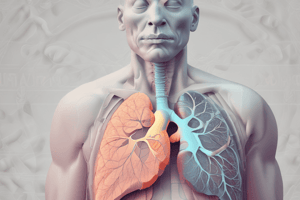Podcast
Questions and Answers
What is the initial imaging technique used for detecting lung lesions?
What is the initial imaging technique used for detecting lung lesions?
- MRI
- CT Scan
- Chest X-ray (correct)
- Ultrasound
Which therapy is specifically indicated for early-stage lung cancer?
Which therapy is specifically indicated for early-stage lung cancer?
- Chemotherapy
- Targeted Therapy
- Lobectomy (correct)
- Radiation Therapy
What is a common clinical manifestation of lung cancer?
What is a common clinical manifestation of lung cancer?
- Frequent urination
- Persistent cough (correct)
- Sore throat
- Rash
What is one of the goals of care for a patient with lung cancer?
What is one of the goals of care for a patient with lung cancer?
Which of the following treatments targets specific molecules to reduce toxicity?
Which of the following treatments targets specific molecules to reduce toxicity?
What is an important nursing diagnosis related to lung cancer?
What is an important nursing diagnosis related to lung cancer?
How does immune therapy assist in lung cancer treatment?
How does immune therapy assist in lung cancer treatment?
Late-stage lung cancer might present with which symptom?
Late-stage lung cancer might present with which symptom?
What should be assessed in a patient experiencing respiratory issues?
What should be assessed in a patient experiencing respiratory issues?
What could indicate the presence of palpable lymph nodes in lung cancer?
What could indicate the presence of palpable lymph nodes in lung cancer?
What is the most common type of lung cancer?
What is the most common type of lung cancer?
What percentage of lung cancer cases are classified as small cell lung cancer?
What percentage of lung cancer cases are classified as small cell lung cancer?
Which stage of lung cancer indicates that it has spread to adjacent structures?
Which stage of lung cancer indicates that it has spread to adjacent structures?
What is a characteristic of small cell lung cancer?
What is a characteristic of small cell lung cancer?
What is indicative of the earliest stage of lung cancer?
What is indicative of the earliest stage of lung cancer?
What is the main treatment consideration for small cell lung cancer?
What is the main treatment consideration for small cell lung cancer?
In which stage is lung cancer likely to have metastasized to distant organs?
In which stage is lung cancer likely to have metastasized to distant organs?
Which method is primarily used for screening lung cancer in smokers?
Which method is primarily used for screening lung cancer in smokers?
Which of the following is NOT a stage of lung cancer?
Which of the following is NOT a stage of lung cancer?
What does it mean if lung cancer is described as 'in situ'?
What does it mean if lung cancer is described as 'in situ'?
Flashcards are hidden until you start studying
Study Notes
Types of Lung Cancer
- Two main types: non-small cell lung cancer (80%) and small cell lung cancer (20%).
- Adenocarcinoma: Most common subtype of non-small cell lung cancer.
- Squamous cell carcinoma: Another type within non-small cell lung cancer.
- Small cell lung cancer grows rapidly and is more challenging to treat, often diagnosed after metastasis.
Staging of Lung Cancer
- Stage 1: Cancer confined to the lung.
- Stage 2: Cancer has spread to nearby lymph nodes.
- Stage 3: Cancer has invaded adjacent structures or multiple sites within the same lung.
- Stage 4: Distant metastasis to other organs, including another lung or bones, and fluid accumulation around the lungs.
Diagnostic Procedures
- Initial screening for smokers includes chest X-ray, followed by CT scan and bronchoscopy for typing and staging.
- Lesions become detectable via X-ray only when they reach a size of about 1 cm, which may take up to two years.
- Additional assessments include MRI, liver function tests, and routine labs.
Management Strategies
- Surgery: Recommended for early-stage non-small cell lung cancer; lobectomy is common.
- Radiation Therapy: Often utilized in combination with other treatments.
- Chemotherapy: General treatment method for lung cancer.
- Targeted Therapy: Focuses on specific molecular targets, resulting in less toxicity.
- Immunotherapy: Boosts the immune response against cancer cells; can shrink tumors or slow their growth.
Nursing Management
- Continuous assessment of clinical manifestations is crucial.
- Common symptoms include:
- Persistent cough
- Sputum production
- Hemoptysis
- Chest pain and dyspnea
- Late symptoms: nausea/vomiting, anorexia, weight loss.
- Additional symptoms may include hoarseness and dysphagia, especially if lymph nodes are involved.
Nursing Diagnoses
- Impaired respiratory function
- Pain management needs
- Coping difficulties related to diagnosis
- Deficient knowledge about the disease and treatment process
Goals of Care
- Maintain a patent airway and adequate tissue oxygenation.
- Minimize patient discomfort and provide education to enhance understanding of cancer type.
- Support the patient and family in establishing realistic treatment and prognosis expectations.
Studying That Suits You
Use AI to generate personalized quizzes and flashcards to suit your learning preferences.




